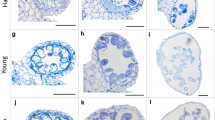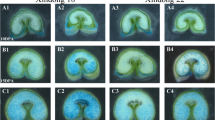Abstract
High-temperature stress causes abortive male reproductive development in many plant species. Here, we report a putative mechanism of high-temperature injury during anther early development in barley plants (Hordeum vulgare L). Under high-temperature conditions (30°C day/25°C night), cell-proliferation arrest, increased vacuolization, over-development of chloroplasts, and certain abnormalities of the mitochondria, nuclear membrane, and rough endoplasmic reticulum (RER) were observed in developing anther cells, but not in developing ovule cells. Moreover, premature degradation of tapetum cells and premature progression to meiotic prophase in pollen mother cells (PMCs) were also observed. To monitor transcriptional alterations during high-temperature injury, we performed DNA microarray analysis using the 22K Barley1 GeneChip. Expression profiles were captured at four time points during the early development of panicles, and during vegetative growth of seedlings as a control, with or without high-temperature treatment. Abiotic or biotic stress related genes were equally or more dominantly up-regulated in the seedlings exposed to high temperatures compared with the panicles. In contrast, certain genes associated with histones, DNA replication initiation, mitochondria, and ribosomes were specifically repressed in the exposed panicles. In situ hybridization studies indicated that repression locally occurred on the developing anther cells exposed to high temperatures. Microarray analysis also indicated that a series of genes, including a meiosis-specific gene Asy1 and anther-specific lipid transfer protein genes, was prematurely up-regulated at an earlier stage under high-temperature conditions. Real-time quantitative RT-PCR analyses well confirmed the expression differences of certain key genes predicted by the DNA microarrays. These results suggest that high-temperature causes premature progression of anther early development program and fate, such as progression to meiosis of PMCs, cell-proliferation arrest and degradation in anther wall cells, accompanied by comprehensive alterations in transcription.






Similar content being viewed by others
References
Abiko M, Akibayashi K, Sakata T, Kimura M, Kihara M, Itoh K, Asamizu E, Sato S, Takahashi H, Higashitani A (2005) High-temperature induction of male sterility during barley (Hordeum vulgare L.) anther development is mediated by transcriptional inhibition. Sex Plant Reprod 18:91–100
Ahmed FE, Hall AE, DeMason DA (1992) Heat injury during floral development in cowpea (Vigna unguiculata, Fabaceae). Am J Bot 79:784–791
Balk J, Leaver CJ (2001) The PET1-CMS mitochondrial mutation in sunflower is associated with premature programmed cell death and cytochrome c release. Plant Cell 13:1803–1818
Close TJ, Wanamaker SI, Caldo RA, Turner SM, Ashlock DA, Dickerson JA, Wing RA, Muehlbauer GJ, Kleinhofs A, Wise RP (2004) A new resource for cereal genomics: 22K barley GeneChip comes of age. Plant Physiol 134:960–968
Crimi M, Astegno A, Zoccatelli G, Esposti MD (2006) Pro-apoptotic effect of maize lipid transfer protein on mammalian mitochondria. Arch Biochem Biophys 445:65–71
Gray WM, Ostin A, Sandberg G, Romano CP, Estelle M (1998) High temperature promotes auxin-mediated hypocotyl elongation in Arabidopsis. Proc Natl Acad Sci USA 95:7197–7202
Ismail AM, Hall AE (1998) Positive and potential negative effects of heat-tolerance genes in cowpea. Crop Sci 38:381–390
Kim SY, Hong CB, Lee I (2001) Heat shock stress causes stage-specific male sterility in Arabidopsis thaliana. J Plant Res 114:301–307
Ku S, Yoon H, Suh HS, Chung YY (2003) Male-sterility of thermosensitive genic male-sterile rice is associated with premature programmed cell death of the tapetum. Planta 217:559–565
Matsui T, Omasa K (2002) Rice (Oryza sativa L.) cultivars tolerant to high temperature at flowering: anther characteristics. Ann Bot 89:683–687
Peet MM, Sato S, Gardner RG (1998) Comparing heat stress effects on male-fertile and male-sterile tomatoes. Plant Cell Environ 21:225–231
Saini HS, Sedgley M, Aspinall D (1983) Effect of heat stress during floral development on pollen tube growth and ovary anatomy in wheat (Triticum aestivum L.). Aust J Plant Physiol 10:137–144
Saini HS, Sedgley M, Aspinall D (1984) Developmental anatomy in wheat of male sterility induced by heat stress, water deficit or abscisic acid. Aust J Plant Physiol 11:243–253
Sakata T, Takahashi H, Nishiyama I, Higashitani A (2000) Effect of high temperature on the development of pollen mother cells and microspores in barley Hordeum vulgare L. J Plant Res 113:395–402
Sugiyama R, Oda H, Kurosaki F (2006) Expression of ASK1-like genes in arrested stamens of female Silene latifolia plant. J Plant Res 119:329–336
Varnier AL, Mazeyrat-Gourbeyre F, Sangwan RS, Clement C (2005) Programmed cell death progressively models the development of anther sporophytic tissues from the tapetum and is triggered in pollen grains during maturation. J Struct Biol 152:118–128
Wang Z, Liang Y, Chijun L, Xu Y, Lan L, Zhao D, Chen C, Xu Z, Xue Y, Chong K (2005) Microarray analysis of gene expression involved in anther development in rice (Oryza sativa L.). Plant Mol Biol 58:721–737
Wellmer F, Alves-Ferreira M, Dubois A, Riechmann JL, Meyerowitz EM (2006) Genome-wide analysis of gene expression during early Arabidopsis flower development. PloS Genet 2:e117, 1012–1024
Acknowledgments
We are very grateful to Drs. Tadashi Sato, Hideyuki Takahashi, Jun Hidema, Nobuharu Fujii, and Yutaka Miyazawa for helpful suggestions and discussions, and Dr. Ryuji Sugiyama for technical supports of in situ hybridization. We also thank Tadashi Sakai of the Ultrastructure Research Laboratories Inc., 5-8-27 Edaminami, Tsuzuki-ku, Yokohama 224-0007, Japan for preparations of TEM samples. This work was supported by a Grant-in-Aid for Scientific Research from the Ministry of Education, Culture, Sports, Science, and Technology and by the Program for Promotion of Basic Research Activities for Innovative Biosciences (PROBRAIN) to M. K-K.
Author information
Authors and Affiliations
Corresponding author
Additional information
Communicated by K. Shirasu.
Electronic supplementary material
Rights and permissions
About this article
Cite this article
Oshino, T., Abiko, M., Saito, R. et al. Premature progression of anther early developmental programs accompanied by comprehensive alterations in transcription during high-temperature injury in barley plants. Mol Genet Genomics 278, 31–42 (2007). https://doi.org/10.1007/s00438-007-0229-x
Received:
Accepted:
Published:
Issue Date:
DOI: https://doi.org/10.1007/s00438-007-0229-x




